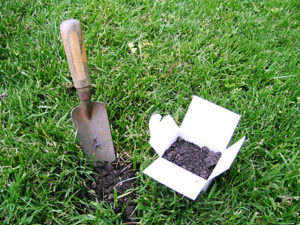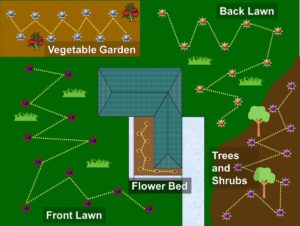Soil Testing for Lawns and Gardens
go.ncsu.edu/readext?312350
en Español / em Português
El inglés es el idioma de control de esta página. En la medida en que haya algún conflicto entre la traducción al inglés y la traducción, el inglés prevalece.
Al hacer clic en el enlace de traducción se activa un servicio de traducción gratuito para convertir la página al español. Al igual que con cualquier traducción por Internet, la conversión no es sensible al contexto y puede que no traduzca el texto en su significado original. NC State Extension no garantiza la exactitud del texto traducido. Por favor, tenga en cuenta que algunas aplicaciones y/o servicios pueden no funcionar como se espera cuando se traducen.
Português
Inglês é o idioma de controle desta página. Na medida que haja algum conflito entre o texto original em Inglês e a tradução, o Inglês prevalece.
Ao clicar no link de tradução, um serviço gratuito de tradução será ativado para converter a página para o Português. Como em qualquer tradução pela internet, a conversão não é sensivel ao contexto e pode não ocorrer a tradução para o significado orginal. O serviço de Extensão da Carolina do Norte (NC State Extension) não garante a exatidão do texto traduzido. Por favor, observe que algumas funções ou serviços podem não funcionar como esperado após a tradução.
English
English is the controlling language of this page. To the extent there is any conflict between the English text and the translation, English controls.
Clicking on the translation link activates a free translation service to convert the page to Spanish. As with any Internet translation, the conversion is not context-sensitive and may not translate the text to its original meaning. NC State Extension does not guarantee the accuracy of the translated text. Please note that some applications and/or services may not function as expected when translated.
Collapse ▲From April – November, Have Your Soil Tested At No Charge
For questions, contact Matt Jones (matt_jones@ncsu.edu)
Learn how to pick up soil boxes and drop off soil samples for delivery here.
- Review Presentation: Soil Testing for Lawns and Gardens (Charlotte Glen)
- Review Presentation: Understanding the Soil Test Report (Charlotte Glen)

Soil testing is the only accurate way to know if you should add nutrients to your lawn or garden.
Healthy soil is the foundation of successful gardening. The first step to cultivating healthy soil is having your soil tested.
Collecting soil samples only takes a few minutes and has many benefits. It can help you save money in your lawn, garden and landscape, can result in healthier plants by telling you which nutrients are already in your soil and which you need to add, and can protect water quality by preventing unnecessary fertilizer applications.
What Will Soil Testing Tell Me About My Soil?
One of the most important things the soil test measures is soil pH, or how acidic or basic your soil is. Soil pH levels in North Carolina range anywhere from 3.5 (very acidic) to 8.0 (basic) or higher. Most ornamental plants, vegetables, fruits, and lawns prefer to grow in soils where the pH is 5.5 to 6.5, though acid-loving plants such as azaleas, camellias, gardenias, loropetalum, and blueberries prefer a soil pH between 5.0 and 5.5.
Soil testing is the only way to know if your soil is too acidic, if you need to add lime to raise pH, and if so how much. Many people apply lime unnecessarily, which can raise soil pH too high, resulting in poor plant growth. Soil test results will also tell you which nutrients you need to apply for the type of plants you are growing. If nutrients are needed, they can be supplied with either natural (organic) or synthetic fertilizers.
Soil test results will not determine if there are diseases or herbicide residues in your soil, or if poor drainage or soil compaction are causing plant problems. If you suspect these issues contact your local Cooperative Extension office for advice.
When Should I Sample?
Submit samples for planting and gardening projects several months before you plan to plant. This will allow plenty of time for you to get the results back and amend the soil before planting.
Soil samples can be submitted for testing any time of the year. Results are usually ready within a few weeks and are posted online. Winter and spring are the lab’s busiest seasons. Samples submitted during these times may take longer to process. Check current processing times.
How Do I Submit Samples?
Boxes and forms for sampling are available from any NC Cooperative Extension County Center (find your local center). During the free season (April -November), the Extension Master Gardener Volunteers of Chatham County will deliver completed soil samples dropped off at the Chatham County Agriculture and Conference Center once a month.
During the peak fee season (Thanksgiving – March 31), completed samples should be mailed to the N.C. Department of Agriculture’s soil testing lab in Raleigh, whose address can be found on the soil sample box and submission form. Download a submission form for home lawn and garden samples.
Ideally, the NCDA recommends submitting the form electronically, as this helps them better track incoming samples.
However, you can also fill out a paper Homeowner Soil Submission Form.
Both electronically submitted and paper submitted forms should have a printed version of the form to accompany submitted boxes.
Learn more about soil test delivery.
WE DO NOT DELIVER SAMPLES FROM THANKSGIVING TO MARCH 31.
What Does It Cost?
Samples submitted from April 1 and by Thanksgiving are analyzed free of charge. North Carolina is one of the few states to offer soil testing at no direct cost to its residents most of the year because of funding derived from a statewide tax on commercial fertilizer. A peak season fee of $4 per sample is charged for each sample submitted between Thanksgiving and March 31.
How Do I Collect Samples?
To have your soil tested, collect samples from different areas of your yard. You will need to randomly collect several samples from each section of your yard where you are growing something different; for example, collect several random samples from your lawn, several samples from your vegetable garden, etc.

Collect several random samples from each area of your yard where different types of plants are growing.
Samples should be collected with a stainless steel trowel and need to be taken around 6” deep. For each sample you submit (example – lawn, garden, flower bed), aim to collect a total of about a cup and a half of soil when the random samples are mixed together. If there are areas in your yard where plants are not growing well be sure to sample them separately to find out if the problem is nutrient or pH related.
Detailed instructions on how to collect and submit soil samples, visit the NCDA website. For a demonstration on collecting soil samples, see this video from NC State Extension.
How Do I Get My Results?
When complete, your results will be sent to you by email (look for a message from AGRONOMIC LIMS) as well as posted online at http://www.ncagr.gov/agronomi/pals/.
For help reading the soil test results, see this guide or contact your local Extension center. Download a detailed publication on the soil test report.
Originally posted by Charlotte Glen. Modified by Matt Jones.




